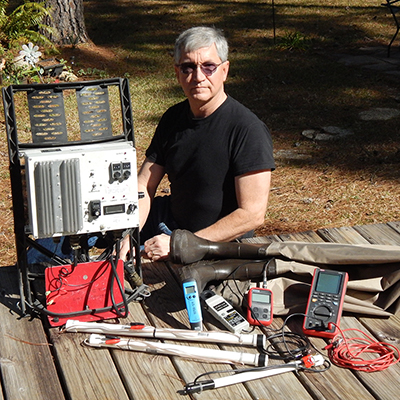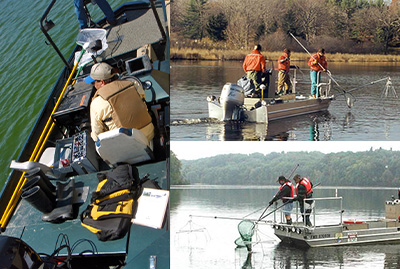Description: Electrofishing is an effective way to sample freshwater fish populations. However, electrofishing may cause fish injury or mortality. Proper balance between efficient sampling and minimal harm is achieved through the knowledge of electrofishing principles and proper use of the techniques and equipment available. This two-day course will cover the principles and practices for boat electrofishing through one classroom days and one field day during which the concepts discussed in class will be demonstrated and practiced by attendees. The class will be taken on an electrofishing equipped craft, and each person will have the opportunity to practice using the boat-based electrofishing system. This field day exercise provides attendees with real-world experience applying the concepts discussed in the classroom. The combination of classroom lecture, field demonstration, and participation exercises gives attendees the knowledge and basic experience they will need to safely and effectively electrofish. "Learning about the theory behind shocking made understanding the techniques much easier. The course felt cohesive, and the order in which subjects were presented made for easy comprehension." James C., May 2016 "I liked how the instructor showed us how the principles of the course could be applied practically to our sampling." Anonymous, May 2016 "Great information for operating electrofishers & background understanding of how they work and why." Mollie O., May 2016 "This seems to be a good course for both beginners and experienced e-fishermen...I appreciated the calibration of the boat to illustrate the concepts in class. Also, the feedback session on the third day helped/answered real world questions." George S., May 2016 |
The NMFS guidance and training requirements document may be downloaded here. You may register online or by calling the Northwest Environmental Training Center at 425-270-3274.
Please wait to receive a course confirmation email, roughly one month prior to the class, before making any non-refundable travel arrangements. Reduced tuition is available for Native American tribes, government employees, nonprofits, students and AFS, NAEP, NEBC, TAEP members.
Intended Audience: This course is intended for biologists, field personnel, and other professionals seeking an improved understanding of the principles and techniques of electrofishing.
Continuing Education Units: 1.30 CEUs
Course Topics
Electric Circuits and Fields - - Principles and terminology
- - Characteristics of AC, DC and pulsed DC waveforms
- - Power transfer
- - Electric field characteristics
- - Effects of size, shape and spacing of electrodes
- - Water conductivity measurement
Fish Behavior and Welfare - - Fish reactions in AC, DC and pulsed DC fields
- - Attracting fish for capture
- - Causes and reductions of fish stress
- - Types and causes of fish injury
- - Reducing fish injury and mortality
- - Effects of electroshock on fish eggs and invertebrates
- - Obtaining permits for boat electrofishing
Boat Electrofishing Systems - - System components
- - Types of equipment
- - Evaluating output
- - Troubleshooting problems
- - Understanding settings
- - Safety features
Boat Operations and Safety - - Safe use of boat electrofishing equipment
- - Common safety issues
- - Safety policies
- - Crew organization
- - Role of first aid and CPR training
Field Trip Exercises - - Waveform output evaluation
- - Electrode resistance measurement
- - Electrical field mapping
- - Voltage threshold for fish capture
- - Fish capture techniques
- - Fish holding, handling, and release
- - Field data requirements
Sampling Design and Applications - - Goal-oriented designs
- - Factors affecting electrofishing efficiency
- - Use and validity of electrofishing data
- - Development of standardized power tables
|
About the Instructor
 Jan Dean, Ph.D Fisheries Science Virginia Tech University 1982, has taught five-day electrofishing courses for the USFWS National Conservation Training Center in several states (MO, AR, LA, AL, FL, NM, AZ, MI, CO), some multiple times, and in New South Wales, Australia since 2008. He has also taught three-day electrofishing classes in CA and AZ for the Northwest Environmental Training Center. Jan has served as an instructor/consultant for an electrofishing workshop in CO and for two workshops for the Missouri Department of Conservation. He served on the graduate committee for two MS students at the University of Missouri for a project involving electrofishing for Smallmouth Bass, Blue Catfish and Flathead Catfish. Jan has served as an instructor for electrofishing workshops at AFS meetings in Savannah GA, Kansas City MO and Oklahoma City OK. Jan has authored or co-authored papers on output performance of boat and backpack electrofishers, on response of invasive species to electricity and on the historical development of electrofishing. He has made presentations on electrofishing research at American Fisheries Society meetings and has consulted on projects involving evaluation of unique boat electrofishers and on electrical barriers to control movement of invasive species. Jan has worked for the University of Arkansas at Pine Bluff, for the Oklahoma Department of Wildlife Conservation, for Northwestern State University of Louisiana, and he retired from the Fish and Wildlife Service.
What to Bring
Please bring a scientific calculator and a pen or pencil, and notepad if you would like to take notes (you may also choose to take notes in your book). Lunch will be on your own, but drinks and snacks will be provided throughout the day. Lunch will be provided on the field trip day.
Billing Information
In order to guarantee a space in a course, the tuition must be paid in full TWO WEEKS before the first day of the course by either check or credit card. State and government agencies paying with a purchase order are allowed payment under the two-week time frame if a copy of the purchase order is received by NWETC.
If You Need to Cancel
Cancellations*-
With 31 or more days notice, we will offer a 100% refund or credit towards a future course. The credit is good for one year and may be applied to any course.
- With 30-8 days notice, we will offer a course credit towards a future course. The credit is good for one year and may be applied to any course.
- With fewer than 8 days notice, there is no course credit available
*Please note that attendee replacement is welcome at any time
Disability Accommodations
Disability Accommodations:To request disability accommodations, please contact us at info@nwetc.org or 425-270-3274 at least 30 days prior to the event.
|










